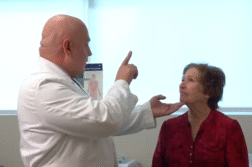PITTSBURGH, Pa. (Ivanhoe Newswire) – More than six and a half million people are living with Alzheimer’s in the United States. More than six million children have attention deficit/hyperactivity disorder, or ADHD. One is usually diagnosed later in life, and the other is diagnosed earlier. But could the two actually be linked? The answer could help save minds and memories.
Different generations, different diagnoses, but surprisingly similar symptoms.
“There were instances that we, kind of, thought were senior moments and they were happening way too often,” Jim Burnham says about his wife, Jane, who was diagnosed with Alzheimer’s.
Emma Krabbe, who was diagnosed with ADHD, says, “Like, your brain wants to shut down and it doesn’t want to take in any more information.”
Symptoms range from carelessness to a lack of focus and forgetfulness. For Alzheimer’s, it’s poor judgement, a lack of focus and of course, memory loss. Now, a new study out of the University of Pittsburgh is looking at a possible link between the two.
“We found that, in fact, the people that have a higher genetic probability to have a ADHD and also have the pathology of Alzheimer in the brain,” explains Tharick Pascoal, MD, PhD, a UPMC psychiatrist.
The study is the first to tie genetic risk of ADHD to the chances of developing late-onset Alzheimer’s disease. By calculating each person’s a ADHD PRS, or polygenic risk score, and matching it with that patient’s signs of Alzheimer’s disease, researchers were able to show that the higher the PRS score, the greater the chances of developing Alzheimer’s.
Researchers are planning larger, more comprehensive studies, including more research to determine whether interventions to correct ADHD can influence the risk of Alzheimer’s disease in the future.
Contributors to this news report include: Marsha Lewis, Producer; Kirk Manson, Videographer; Roque Correa, Editor.
To receive a free weekly e-mail on medical breakthroughs from Ivanhoe, sign up at: http://www.ivanhoe.com/ftk
Sources:
https://www.cdc.gov/ncbddd/adhd/data.html
https://www.nature.com/articles/s41380-022-01867-2
MEDICAL BREAKTHROUGHS
RESEARCH SUMMARY
TOPIC: BRAIN CONNECTION: ADHD & ALZHEIMER’S LINK?
REPORT: MB #5245
BACKGROUND: Attention deficit/hyperactivity disorder – or ADHD – is a common neurodevelopment disorder among children. It affects over 5 million children. ADHD is normally diagnosed in early childhood and stays through adulthood. There are three types: predominantly inattentive presentation, predominantly hyperactive-impulsive presentation, and combined presentation. Alzheimer’s is described as a progressive disease and is the most common form of dementia, with almost 6 million American adults living with the disease. Scientists believe that there might be a link between ADHD and Alzheimer’s disease.
https://cfah.org/adhd-statistics/
https://www.cdc.gov/aging/aginginfo/alzheimers.htm)
SYMPTOMS & DIAGNOSING: Children with ADHD who haven’t been diagnosed yet may seem like they are going through a phase at first, but the symptoms will continue after childhood and may even become worse. Symptoms may include, but are not limited to: constant daydreaming, forgetfulness, carelessness, and/or having a hard time resisting temptation. Doctors usually diagnose ADHD by observing symptoms and a medical exam. People with Alzheimer’s may show a couple of the same symptoms like forgetfulness, but some other symptoms are difficulty completing familiar tasks, poor judgment, and/or changes in mood. Alzheimer’s can be diagnosed with a series of tests or specific PET scans that measure amyloid and tau proteins in the fluid part of blood and cerebral spinal fluid.
https://www.cdc.gov/aging/aginginfo/alzheimers.htm
https://www.mayoclinic.org/diseases-conditions/alzheimers-disease/diagnosis-treatment/drc-20350453)
NEW TECHNOLOGY: University of Pittsburgh neurologist, Dr. Tharick Pascoal is studying a possible link between ADHD and Alzheimer’s disease. He believes that children diagnosed with ADHD might have a higher risk of developing Alzheimer’s in adulthood. Dr. Pascoal says more research is needed to confirm this link. Dr. David Merrill, a psychiatrist, and director of the Pacific Neuroscience Institute’s Pacific Brain Health Center at Providence Saint John’s Health Center, says that this study does show “that amyloid buildup in the brain alone may not result in Alzheimer’s disease.” Dr. Merrill continues to say “the presence of comorbid genetic risks for conditions like ADHD may lead to amyloid-driven tau tangles and brain shrinkage. It’s ultimately these multi-factorial cascades that lead to the devastating syndrome of symptoms seen in full-blown Alzheimer’s disease.” What is not known “is whether or not treating ADHD with stimulants or other interventions will prevent or slow Alzheimer’s disease.”
FOR MORE INFORMATION ON THIS REPORT, PLEASE CONTACT:
Anastasia Gorelova
If this story or any other Ivanhoe story has impacted your life or prompted you or someone you know to seek or change treatments, please let us know by contacting Marjorie Bekaert Thomas at mthomas@ivanhoe.com




